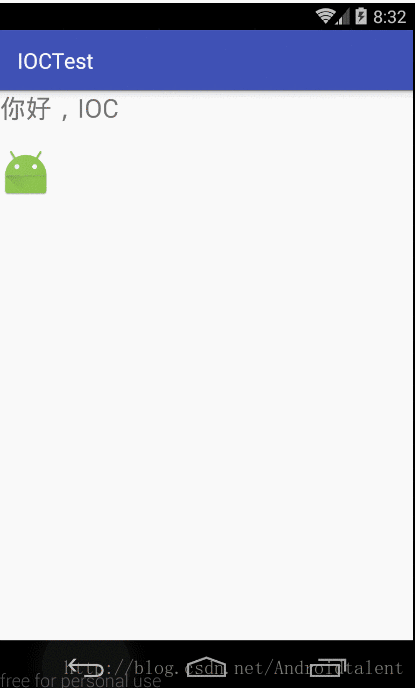Android 自己打造IOC注解框架
Android中IOC框架就是注入控件和布局或者说是设置点击监听,网上有很多成熟的注解框架例如xUtils,afinal,butterknife等等。你可能会问,既然已经有好的框架为何还要造轮子?因为,首先我是学习,学习框架的设计以及实现,其次是拓展,适合自己的轮子才是好轮子,所以我添加了判断网络状态的注解。此处特别感谢辉哥,他的技术分享是我的楷模。
首先看看最终完成的效果
public class MainActivity extends AppCompatActivity {
@ViewById(R.id.tv_hello)
private TextView tv_hello;
@ViewById(R.id.iv_img)
private ImageView iv_img;
@Override
protected void onCreate(Bundle savedInstanceState) {
super.onCreate(savedInstanceState);
setContentView(R.layout.activity_main);
ViewUtils.inject(this);
tv_hello.setText("你好,IOC");
}
@OnClick({R.id.tv_hello, R.id.iv_img})
@CheckNet
private void sayHello(){
Toast.makeText(this, tv_hello.getText().toString(), Toast.LENGTH_SHORT).show();
}
}有网状态下,可以正常点击然后提示,无网状态下提示网络的问题。
下面看看具体实现
我阅读了xUtils和butterknife的源码,xUtils使用有点麻烦,butterknife的定义(变量,方法等)只能是public,所以我结合两者,造出适合自己的,习惯是private定义,以及追求使用方便。
首先要了解一下反射机制,不懂的话百度一下
好。coding
属性注入 : 利用反射去 获取Annotation –> value –> findViewById –> 反射注入属性
事件注入 :利用反射去 获取Annotation –> value –> findViewById –> setOnclickListener –> 动态代理反射执行方法
新建一个Module,添加以下的类
View注解的Annotation
/**
* @creation_time: 2017/5/7
* @author: Vegen
* @e-mail: [email protected]
* @describe: View注解的Annotation
*/
//@Target(ElementType.FIELD) 代表Annotation的位置 FIELD代表属性 TYPE类上 CONSTRUCTOR构造函数上 METHOD方法上面
@Target(ElementType.FIELD)
//@Retention(RetentionPolicy.CLASS) 什么时候生效 CLASS代表编译时 RUNTIME运行时 SOURCE源码资源
@Retention(RetentionPolicy.RUNTIME)
public @interface ViewById {
//@ViewById(R.id,xxx)
int value();
}View辅助类
/**
* @creation_time: 2017/5/7
* @author: Vegen
* @e-mail: [email protected]
* @describe: View辅助类
*/
public class ViewFinder {
private Activity activity;
private View view;
public ViewFinder(Activity activity) {
this.activity = activity;
}
public ViewFinder(View view) {
this.view = view;
}
public View findViewById(int viewId){
return activity != null ? activity.findViewById(viewId) : view.findViewById(viewId);
}
}View工具类
/**
* @creation_time: 2017/5/7
* @author: Vegen
* @e-mail: [email protected]
* @describe: View工具类
*/
public class ViewUtils {
public static void inject(Activity activity){
inject(new ViewFinder(activity), activity);
}
public static void inject(View view){
inject(new ViewFinder(view), view);
}
public static void inject(View view, Object object){
inject(new ViewFinder(view), object);
}
// 兼容上面三个方法 object是反射需要执行的类
public static void inject(ViewFinder finder, Object object){
// 注入属性
injectFile(finder, object);
// 注入事件
injectEvent(finder, object);
}
/**
* 事件注入
* @param finder
* @param object
*/
private static void injectEvent(ViewFinder finder, Object object) {
// 1、获取类的所有方法
Class clazz = object.getClass();
Method[] methods = clazz.getDeclaredMethods();
// 2、获取OnClick里面的value值
for (Method method : methods){
OnClick onClick = method.getAnnotation(OnClick.class);
if (onClick != null){
int[] viewIds = onClick.value();
for (int viewId : viewIds){
// 3、findViewById找到View
View view = finder.findViewById(viewId);
//拓展功能 检测网络
boolean isCheckNet = method.getAnnotation(CheckNet.class) != null;
if (view != null){
// 4、setOnClickListener
view.setOnClickListener(new DeclaredOnClickListener(method, object, isCheckNet));
}
}
}
}
}
private static class DeclaredOnClickListener implements View.OnClickListener{
private Object mObject;
private Method mMethod;
private boolean mIsCheckNet;
public DeclaredOnClickListener(Method method, Object object, boolean isCheckNet) {
this.mMethod = method;
this.mObject = object;
this.mIsCheckNet = isCheckNet;
}
@Override
public void onClick(View view) {
//判断是否需要检测网络
if (mIsCheckNet){
//需要
if (!isNetConnected(view.getContext())){
Toast.makeText(view.getContext(), "请检查网络,请稍后重试", Toast.LENGTH_SHORT).show();
return;
}
}
//点击会调用该方法
try {
// 所有方法都可以 包括私有公有
mMethod.setAccessible(true);
// 5、反射注入执行方法
mMethod.invoke(mObject, view);
} catch (Exception e) {
e.printStackTrace();
try {
mMethod.invoke(mObject, null);
} catch (Exception e1) {
e1.printStackTrace();
}
}
}
}
/**
* 检测手机数据是否可用
*/
public static boolean isMobileNetConnected(Context context){
ConnectivityManager cm = (ConnectivityManager) context.getSystemService(context.CONNECTIVITY_SERVICE);
return cm.getNetworkInfo(ConnectivityManager.TYPE_MOBILE).isConnected();
}
/**
* 检测WIFI是否开启可用
*/
public static boolean isWifiNetConnected(Context context){
ConnectivityManager cm = (ConnectivityManager) context.getSystemService(context.CONNECTIVITY_SERVICE);
return cm.getNetworkInfo(ConnectivityManager.TYPE_WIFI).isConnected();
}
/**
* 检测网络是否可用
*/
public static boolean isNetConnected(Context context){
return isMobileNetConnected(context) || isWifiNetConnected(context);
}
/**
* 注入属性
* @param finder
* @param object
*/
private static void injectFile(ViewFinder finder, Object object) {
// 1、获取类里面的所有的属性
Class clazz = object.getClass();
// 获取所有属性包括私有和公有
Field[] fields = clazz.getDeclaredFields();
// 2、获取ViewById里面的value值
for (Field field : fields){
ViewById viewById = field.getAnnotation(ViewById.class);
if (viewById != null){
// 获取注解里面的id值
int viewId = viewById.value();
// 3、findViewById找到View
View view = finder.findViewById(viewId);
if (view != null) {
// 能够注入所有的修饰符 private public
field.setAccessible(true);
// 4、动态注入找到的View
try {
field.set(object, view);
} catch (IllegalAccessException e) {
e.printStackTrace();
}
}
}
}
}
}
View 事件注解的Annotation
/**
* @creation_time: 2017/5/7
* @author: Vegen
* @e-mail: [email protected]
* @describe: View 事件注解的Annotation
*/
//@Target(ElementType.FIELD) 代表Annotation的位置 FIELD代表属性 TYPE类上 CONSTRUCTOR构造函数上 METHOD方法上面
@Target(ElementType.METHOD)
//@Retention(RetentionPolicy.CLASS) 什么时候生效 CLASS代表编译时 RUNTIME运行时 SOURCE源码资源
@Retention(RetentionPolicy.RUNTIME)
public @interface OnClick {
//@ViewById(R.id,xxx)
int[] value();
}View 网络状态注解的Annotation
/**
* @creation_time: 2017/5/7
* @author: Vegen
* @e-mail: [email protected]
* @describe: View 网络状态注解的Annotation
*/
//@Target(ElementType.FIELD) 代表Annotation的位置 FIELD代表属性 TYPE类上 CONSTRUCTOR构造函数上 METHOD方法上面
@Target(ElementType.METHOD)
//@Retention(RetentionPolicy.CLASS) 什么时候生效 CLASS代表编译时 RUNTIME运行时 SOURCE源码资源
@Retention(RetentionPolicy.RUNTIME)
public @interface CheckNet {
}好,到此为止已经完成注解框架了,下面看看使用
MainActivity
public class MainActivity extends AppCompatActivity {
@ViewById(R.id.tv_hello)
private TextView tv_hello;
@ViewById(R.id.iv_img)
private ImageView iv_img;
@Override
protected void onCreate(Bundle savedInstanceState) {
super.onCreate(savedInstanceState);
setContentView(R.layout.activity_main);
ViewUtils.inject(this);
tv_hello.setText("你好,IOC");
}
@OnClick({R.id.tv_hello, R.id.iv_img})
@CheckNet
//方法名随意
private void sayHello(){
Toast.makeText(this, tv_hello.getText().toString(), Toast.LENGTH_SHORT).show();
}
}布局文件activity_main.xml
<LinearLayout xmlns:android="http://schemas.android.com/apk/res/android"
xmlns:app="http://schemas.android.com/apk/res-auto"
xmlns:tools="http://schemas.android.com/tools"
android:layout_width="match_parent"
android:layout_height="match_parent"
tools:context="com.vegen.study.ioctest.MainActivity"
android:orientation="vertical">
<TextView
android:id="@+id/tv_hello"
android:layout_width="wrap_content"
android:layout_height="wrap_content"
android:text="Hello World!"
android:textSize="24sp"
app:layout_constraintBottom_toBottomOf="parent"
app:layout_constraintLeft_toLeftOf="parent"
app:layout_constraintRight_toRightOf="parent"
app:layout_constraintTop_toTopOf="parent" />
<ImageView
android:id="@+id/iv_img"
android:layout_marginTop="20dp"
android:layout_width="wrap_content"
android:layout_height="wrap_content"
android:src="@mipmap/ic_launcher"/>
LinearLayout>
别忘了添加网络访问权限
<uses-permission android:name="android.permission.INTERNET" />
<uses-permission android:name="android.permission.ACCESS_NETWORK_STATE" />具体代码以及demo已经开源到我的github,欢迎star,有问题交流一下,地址:Vegen的github
